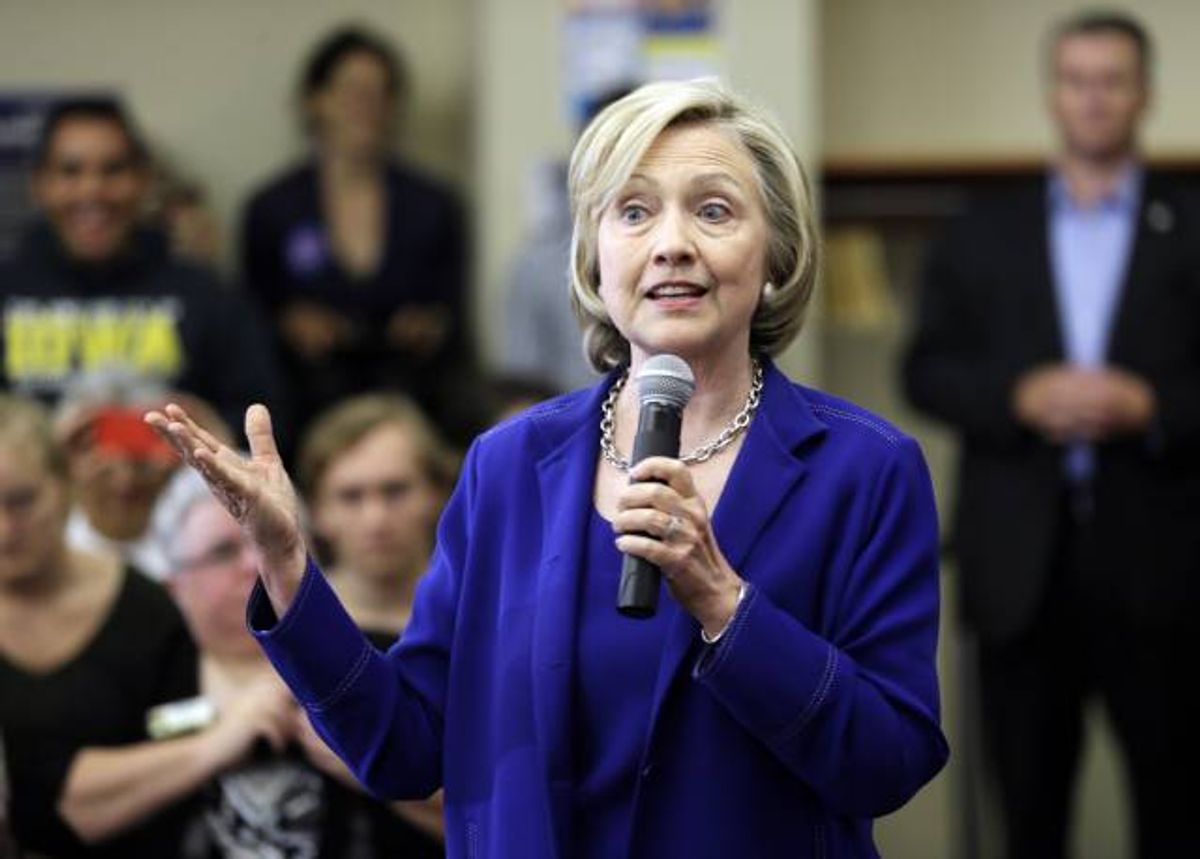The degree to which candidate Hillary Clinton will have to answer for President Bill Clinton’s mistakes has always, I think, been overstated. The most obvious reason, of course, is that although she shares a name with the 42nd president, she is quite clearly a distinct, separate human with a record of her own that we can evaluate and parse. Another good reason? She’s the one widely expected to be the Democratic nominee in 2016; he hasn’t been on a ballot for nearly 20 years.
Still, there’s no point in denying that the leftward drift of the Democratic Party since the ‘90s — most especially and recently on economic issues — will create for Clinton some awkward moments. As one should suspect, given that she represented the State of New York, her record in the Senate on Wall Street reform leaves much to be desired. When she was on the board of Wal-Mart in the late '80s and early '90s, she reportedly devoted no real energy to challenging the company’s woeful labor practices. Her skepticism of free-trade deals like NAFTA is new, ill-defined and exceedingly cautious.
She did not, in other words, spend the ‘90s and the aughts going against the neoliberal grain. Unlike Sen. Bernie Sanders, she will not be able to point to the financial crash in 2008, or the subsequent top-heavy, middling recovery, and claim she warned us all along. But if we accept that what a politician thinks is much less important than what she does — and if we believe that a politician tends to do whatever she thinks best strikes the balance between justice and reelection — then Clinton’s Monday speech on the economy should be greeted by those of us on the left with enthusiasm (or at least relief).
I say that about the speech because it answers the most important question about Clinton, at least for the current campaign. Namely, has Clinton spent much of her career defending neoliberalism because that was the zeitgeist of the era? Or did she do so because she is a dedicated believer that free markets are always the solution, regardless of whatever happens to be in vogue among the liberal intelligentsia? If the answer is the former, it means Clinton will follow the lead of the Democratic Party’s coalition, which is currently sprinting leftward on economics. If the answer is the latter, however, it means lefties need Sanders even more than they think.
Thankfully, the speech, like most of those she’s delivered so far, gave every indication that the truth is much closer to that first scenario than the second. Clinton ticked off a list of economic priorities that lined up quite neatly with a major report released this year by the Roosevelt Institute and Joseph Stiglitz. It included more funding for early childhood development, higher taxes on Wall Street, appointing regulators with some backbone, and making it easier for workers to unionize and collectively bargain. She still depicted growth as if it were a panacea (it isn’t). But she didn’t soft-sell the fact that her plan is, overall, unabashedly redistributive.
The most telling moment of the address, however, arrived just before its conclusion. It was a vague promise that, during a second Clinton administration, the era of “too big to jail” would be finished:
Stories of misconduct by individuals and institutions in the financial industry are shocking. HSBC allowing drug cartels to launder money, five major banks pleading guilty to felony charges for conspiring to manipulate currency exchange and interest rates. There can be no justification or tolerance for this kind of criminal behavior.
And while institutions have paid large fines and in some cases admitted guilt, too often it has seemed that the human beings responsible get off with limited consequences or none at all, even when they have already pocketed the gains. This is wrong, and on my watch it will change.
As is the case with nearly every political speech, Clinton’s economic address was valuable more for its symbolism than any concrete promises. But symbolism matters in politics, and there’s something remarkable about hearing a Clinton pander to those who’d like to see her Wall Street buddies in the dock. She seems to understand that, despite what her husband said, the “era of big government” is not over. And as long as she knows that now, there’s no point worrying about way back when.

Shares